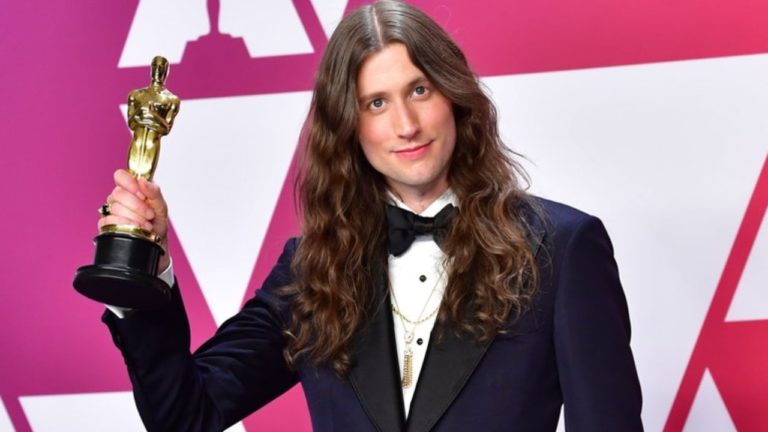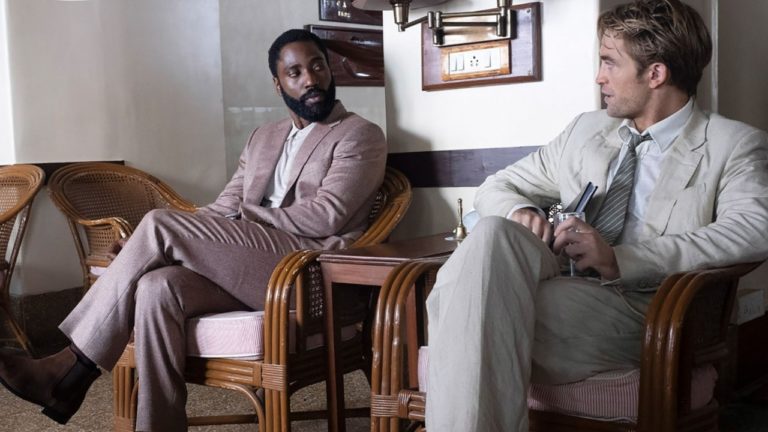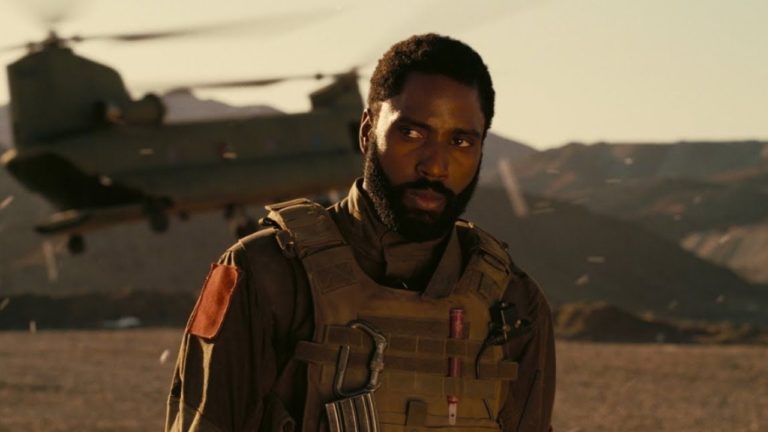Ludwig Goransson on TENET – how he composed an inverted score and the inspiration behind main themes
Cinema Com Rapadura had the chance to talk to the Academy Award winner composer about the score for the new Christopher Nolan movie.
Se você quer a ler a versão em português deste artigo – clique aqui.
When Christopher Nolan’s new film, “Tenet”, was announced in 2019, we soon discovered that the score would be composed by Ludwig Goransson, Oscar winner for “Black Panther”. The news came as a surprise to many, as Nolan has partnered with Hans Zimmer since “Batman Begins”. However, Goransson would prove to be not only a smart choice for the project, but an essential one. The “Tenet” soundtrack is one of the main components of the film, and it is what takes Nolan’s visual mastery to another level.
Cinema Com Rapadura had the chance to chat with Goransson, an exclusive opportunity provided by Warner Bros. Pictures, and I was able to talk to the composer about the whole incredible process of writing a score like this.

For Ludwig, just the chance to work with Nolan would be worth it:
“The chance of working with Christopher Nolan was a life changing experience for me, to get to peek behind the curtain and get to see how he does what he does. I’ve always been inspired by his movies, and by what he and Hans Zimmer have done together, they were a big inspiration for me growing up in my career. So to have an opportunity to work with him, see how he creates, see how he does his art, it was very exciting for me.”
It would be impossible to join a Christopher Nolan film without the weight of what the filmmaker and Hans Zimmer have been doing since 2005. The duo worked on six films together – the Batman trilogy, “Inception”, “Interstellar” and “Dunkirk”. But Ludwig is not a newcomer to the industry, in fact he is the man of the hour. In addition to winning the Oscar for the “Black Panther” score, the composer also worked on the two “Creed” films, and is responsible for “The Mandalorian”, the “Star Wars” live-action series.
Nolan recognized Goransson’s talent, and the work started very early:
“When we started working together, he had me write the score extremely early, 3 or 4 months before he started shooting the movie. So I read the script and had a long conversation about it, and he immediately asked me if I wanted to start writing. So I started writing music based on the script. And I spent about 3 months writing about 2/3 hours of music. They got to shoot all over the world, 7 different countries. And he had 10 cds with my music on it. So they had a lot of music while they were shooting. Actually, not cds, he was already using the first generation iPod”.
The official “Tenet” album was released on September 3, alongside the film’s premiere in several countries around the world. With 17 tracks, an original song and 2 bonus tracks (recently added), the set has a wealth of themes. But in this intense journey, what was the first theme, the first idea inspired by the complicated story of “Tenet”?
“One of the things on the script that stood out to me was imagining the theme of the nature of those windmills. When they were on those wind farms, and on the boats, because I’m from Sweden, and they shot that out in Denmark, so I’ve always been curious about those windfarms, cause it looks so incredible. So naturally that was one of the first things that caught my attention while reading the script. So I had an idea, me and Chris, what if we had music that sounds like the wind. So, you know when you’re a kid and one of the first ways to create music when you were a kid, or at least when I grew up, was listening to the radio, or to a CD, and playing with the volume knob, up and down, so I thought that is what’s so fun, and one of the first ways I created music as a child. That technology is kind of lost now, we don’t have volume knobs anymore. So I thought I could play with that sound for a while. If you play with volume up and down, and if you reverse it, you don’t know if it’s backwards or forwards. So one of the first things I did was to create Neil’s theme. Which is pretty good with the way he moves in time, you’re not sure how he moves through time when you first watch it”.
Neil, played by Robert Pattinson, is one of the highlights of the film, and the theme above arises just when the character is introduced to John David Washington’s Protagonist. Watching the feature, the song really draws attention, as if it’s saying something to the audience, something we don’t know, and maybe we don’t need to know. Intrigued by the meaning of the theme, I asked if Nolan had said anything about the character that helped Ludwig reach the final result.
“Yeah, absolutely. There are a lot of things that we don’t know, and a lot of things we don’t need to know. One of the things that was so interesting about when I first wrote that music is that it was the way I saw the movie, I didn’t have the intention that it was going to be Neil’s theme. So when Chris had that idea, that what if this was Neil’s theme and the friendship [with the Protagonist], I was a little surprised at first. But then when I saw picture, I really understood what he meant and why it worked. There are so many levels, and the only way you learn more about it, is the more you watch the movie”.
We can’t speculate on Neil, and what the use of his theme could mean, without getting into spoilers, but still intrigued, I told the composer that I could have sworn I heard notes from the track Betrayal in the second half of Meeting Neil (those who know where Betrayal fits might understand better this remark), to which Goransson replied:
“Everything is connected more or less in the music. There are moments when everything is playing on top of each other, transitioning in and out of each other. So there’s a lot to read into it”.

I mentioned my podcast Janela Sonora, and how excited I am to dissect “Tenet”’s themes in it, and Ludwig said: “I’m excited to hear your analysis of the score” – so Ludwig, feel invited to participate!
One of the most important elements of the “Tenet” score, and of the film itself, is inversion. In various moments, the music feels like “going back in time”, like a tape being rewound, and there are times when we don’t know if the music is going forwards or backwards. On the process of getting this idea across, Goransson explained:
“It was just with experimentation. It was very encouraging experimenting with the new techniques of recording music and recording musicians. I had to erase as much as I could of how I typically record music. I wanted to reverse the entropy of the instruments. And experiment with time signatures, to enhance the feeling of that inversion. You know when you see the Protagonist stepping into a water puddle in reverse? That was where a lot of the music was found. So I had to try completely new methods and make things sound reversed. I recorded percussionists and I had them play the main rhythm of the theme, and I recorded them, and I reversed the recording in my computer, and I played for the musicians and I asked them to emulate the recording, the backwards recording. It was very difficult for them, but they were really good, so they got pretty close. So I recorded them, and I reversed that recording again on my computer”.
Feel lost yet? That’s basically the feeling of watching “Tenet”, and I love it.
Finally, let’s talk about the Protagonist. John David Washington’s nameless character leads the film with all the pomp and skill one expects from a secret agent, while also subverting expectations of what is expected of a character like that. His presence and charisma are unquestionable, and in the actor Nolan found a perfect Protagonist. Thus, his theme had to reflect everything that Washington brought to the role. We hear two parts of the Protagonist’s theme at different times in the film, and, agreeing with this analysis, Ludwig explains the thinking behind the choice:
“The way that John David moves, when I saw that first scene, the prologue, when he’s running in the siege, the terror attack in the Opera House. When I saw the way he was moving, how he was running, it was extremely rhythmical, as an athlete that way he was moving, it’s not dancing, but his force, so it was very beautiful and inspirational for me. So the tempo of the music was very inspired by that. So yeah, that was a good analysis, there are two ways the Protagonist’s theme goes. One is the five notes in the guitar, which is what you hear the first time [in Rainy Night in Tallinn]. And there’s the slower version, where there’s a different variation of the theme, a longer version [in The Protagonist]. For me it’s kind of like his future self talking to himself, guiding him”.

Although the work on composing the “Tenet” score started before filming, the recording process with the orchestra took place during the pandemic, which added an extra difficulty to an already complicated work. But Ludwig Goransson and the entire team behind this work achieved a real feat, on a score that could mark the composer’s second Oscar nomination – fingers crossed.
“Tenet” is playing in Brazilian cinemas.
Saiba Mais: Christopher Nolan, John David Washington, Ludwig Goransson, Robert Pattinson, Tenet

 >
>